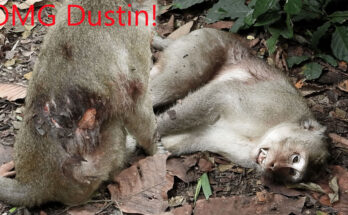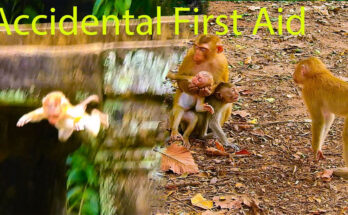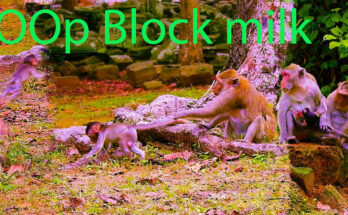aby monkeys are some of the most adorable creatures in the animal kingdom. Their playful nature, tiny fingers, and expressive eyes make them irresistible to many animal lovers. However, beyond their cuteness, baby monkeys rely entirely on their mothers for survival, especially in the first few months of life. One of the most crucial aspects of their early development is being fed and nourished by their mother’s milk. Mother monkeys provide their babies with all the nutrition they need to grow strong and healthy. This natural process ensures that baby monkeys thrive in their environment, developing physically, emotionally, and socially.
The Importance of Mother’s Milk for Baby Monkeys
Mother’s milk is the best source of nutrition for baby monkeys, just as it is for human infants. It contains essential nutrients that support their growth and immune system. In the wild, baby monkeys nurse frequently, sometimes for several months or even years, depending on the species. This milk provides them with everything they need to develop into healthy juveniles.
1. Essential Nutrients in Mother’s Milk
Monkey mothers produce milk that is specifically designed for their babies. It contains:
- Proteins and fats that support brain development and energy needs.
- Vitamins and minerals essential for strong bones and muscle growth.
- Antibodies that help protect against diseases and infections.
Unlike artificial substitutes, a mother monkey’s milk changes as the baby grows, ensuring they receive the right nutrients at every stage of development.
2. Strengthening the Immune System
In the wild, baby monkeys are exposed to various bacteria and viruses. Their mother’s milk plays a crucial role in strengthening their immune system. The antibodies in the milk help the baby monkey fight off infections and build immunity against diseases. This natural protection is essential, especially in the first few weeks when the baby is most vulnerable.
3. Supporting Growth and Development
Proper nourishment from mother’s milk ensures that baby monkeys grow at a healthy rate. The nutrients in the milk help in the development of their bones, muscles, and internal organs. Without adequate milk, a baby monkey may suffer from malnutrition, weakness, and stunted growth, which can affect their ability to survive in the wild.
The Bond Between Mother and Baby
Nursing is not just about nutrition—it also plays a vital role in strengthening the emotional bond between a mother and her baby. This connection provides comfort, security, and learning opportunities that shape the baby monkey’s future behavior.
1. Comfort and Emotional Security
Baby monkeys rely on their mothers not only for food but also for warmth and protection. When nursing, they feel secure and develop a strong attachment to their mother. This bond helps them grow into confident and well-adjusted juveniles.
2. Learning Essential Social Skills
As baby monkeys nurse and stay close to their mothers, they begin to observe and learn important social behaviors. They watch how their mother interacts with other members of the group, how she finds food, and how she reacts to danger. These lessons are essential for their survival in the wild.
3. Gradual Weaning Process
Mother monkeys do not stop nursing their babies suddenly. Instead, weaning is a gradual process. As the baby grows, they begin to eat solid foods while still nursing. This transition period helps them adapt to new foods while still getting some nourishment from their mother’s milk.
The Dangers of Separating Baby Monkeys from Their Mothers
Unfortunately, in some situations, baby monkeys are taken away from their mothers too soon. This can happen due to the exotic pet trade, zoos, or unethical breeding practices. Separating a baby monkey from its mother at an early age can have serious consequences.
1. Malnutrition and Weakened Immune System
Without their mother’s milk, baby monkeys may not get the right balance of nutrients. Many captive monkeys are fed improper diets, leading to malnutrition, weak bones, and a higher risk of infections.
2. Emotional Distress and Behavioral Problems
Baby monkeys that are separated from their mothers too early often experience stress and anxiety. They may develop behavioral issues, such as excessive crying, self-harm, or aggression. The emotional trauma of separation can affect them for life.
3. Difficulty in Socializing
Monkeys are highly social animals that learn from their mothers and family groups. A baby monkey that is taken away too soon may struggle to integrate into a group later in life. They may lack the skills needed to interact with other monkeys properly.
Why Mother’s Milk Is the Best Choice
There is no substitute for a mother’s milk when it comes to baby monkeys’ health and development. Artificial feeding methods cannot provide the same level of nutrition and protection that natural nursing offers.
For those who love animals, it is important to recognize that baby monkeys should remain with their mothers in the wild. Instead of supporting the exotic pet trade or engaging with online content that exploits baby monkeys, people should focus on conservation efforts that protect these animals and their natural habitats.
Conclusion
Baby monkeys naturally receive enough milk from their mothers, ensuring they grow strong, healthy, and emotionally secure. Mother’s milk provides essential nutrients, strengthens the immune system, and helps baby monkeys learn critical survival skills. The bond between mother and baby is vital for their well-being, and separating them too early can lead to serious health and emotional problems.
Rather than interfering with this natural process, we should respect and protect it. By supporting conservation efforts and spreading awareness about the importance of keeping baby monkeys with their mothers, we can help ensure that these adorable creatures live happy and healthy lives in their natural environment.


